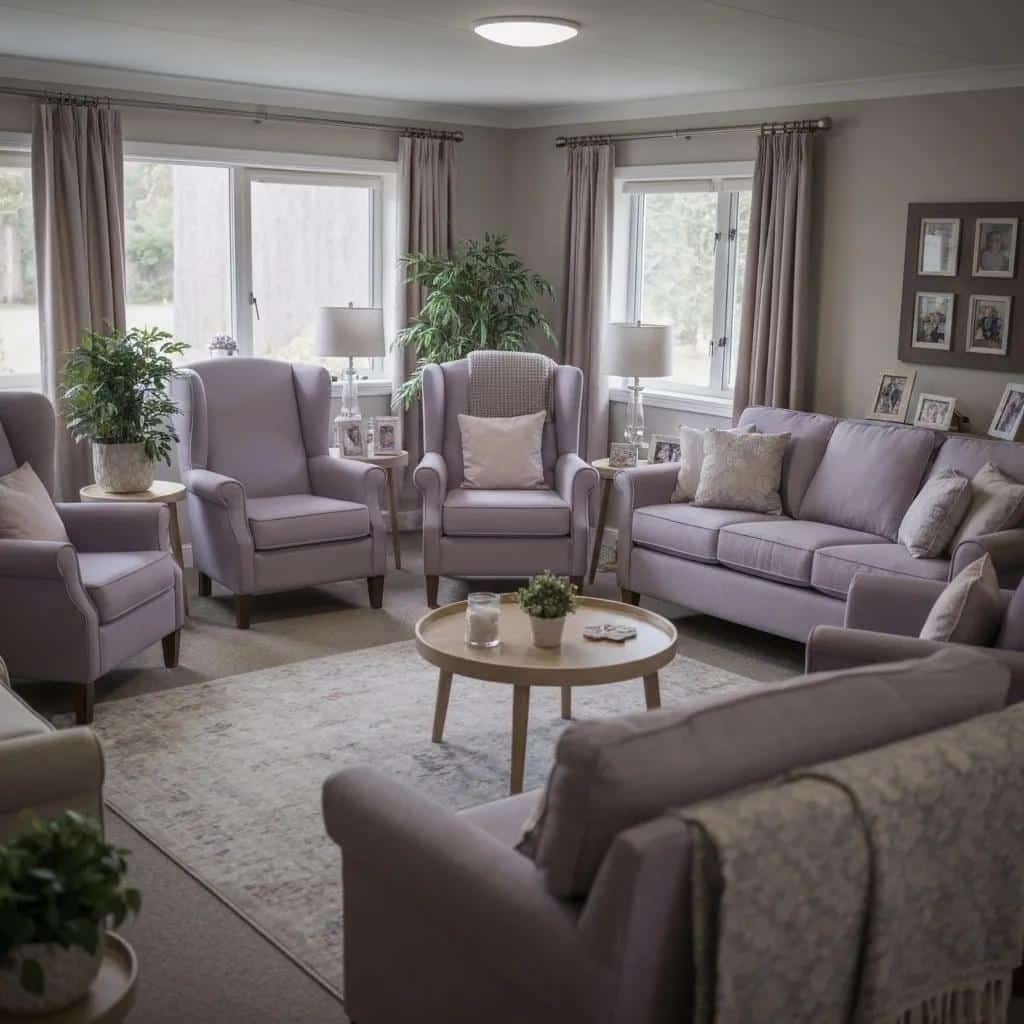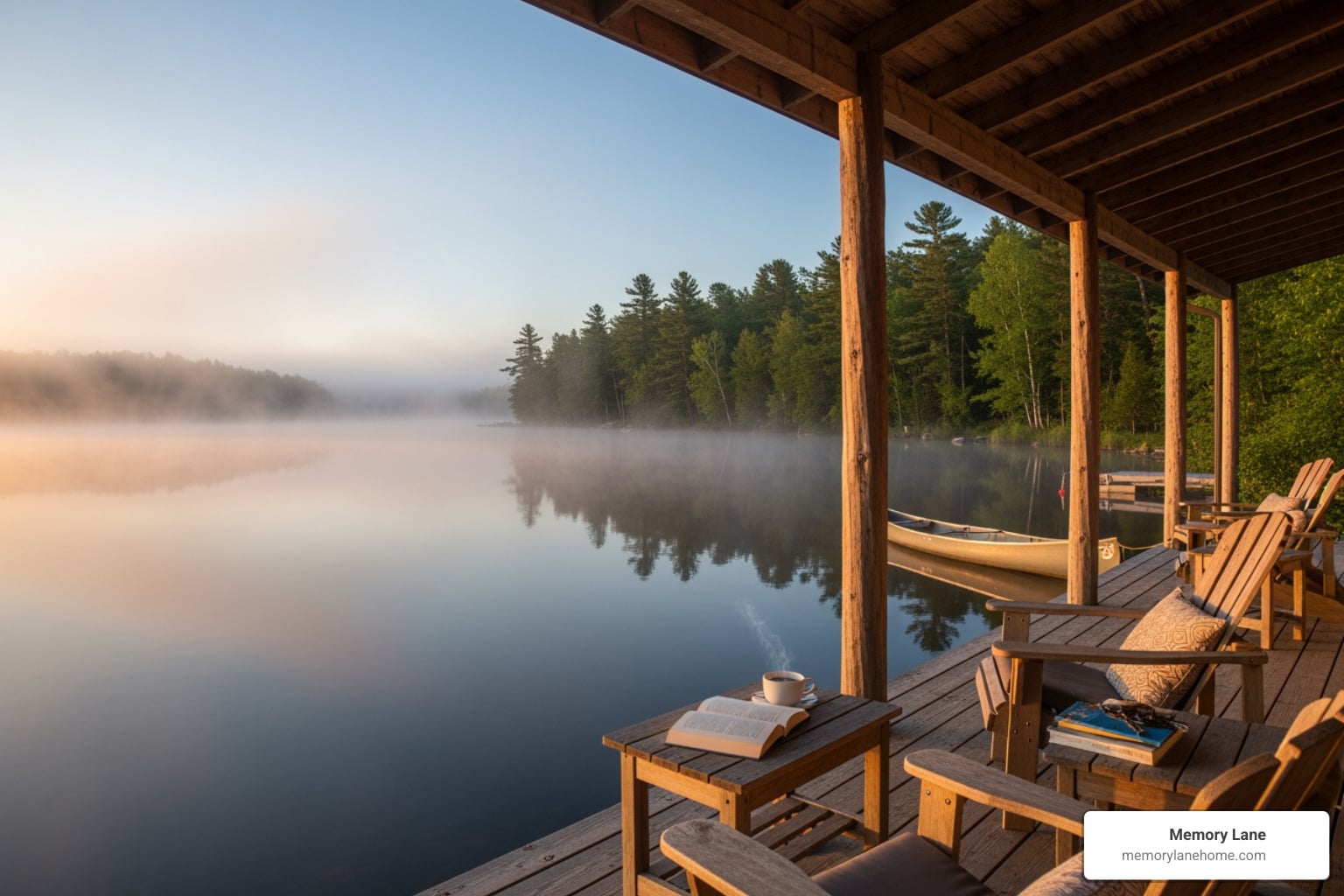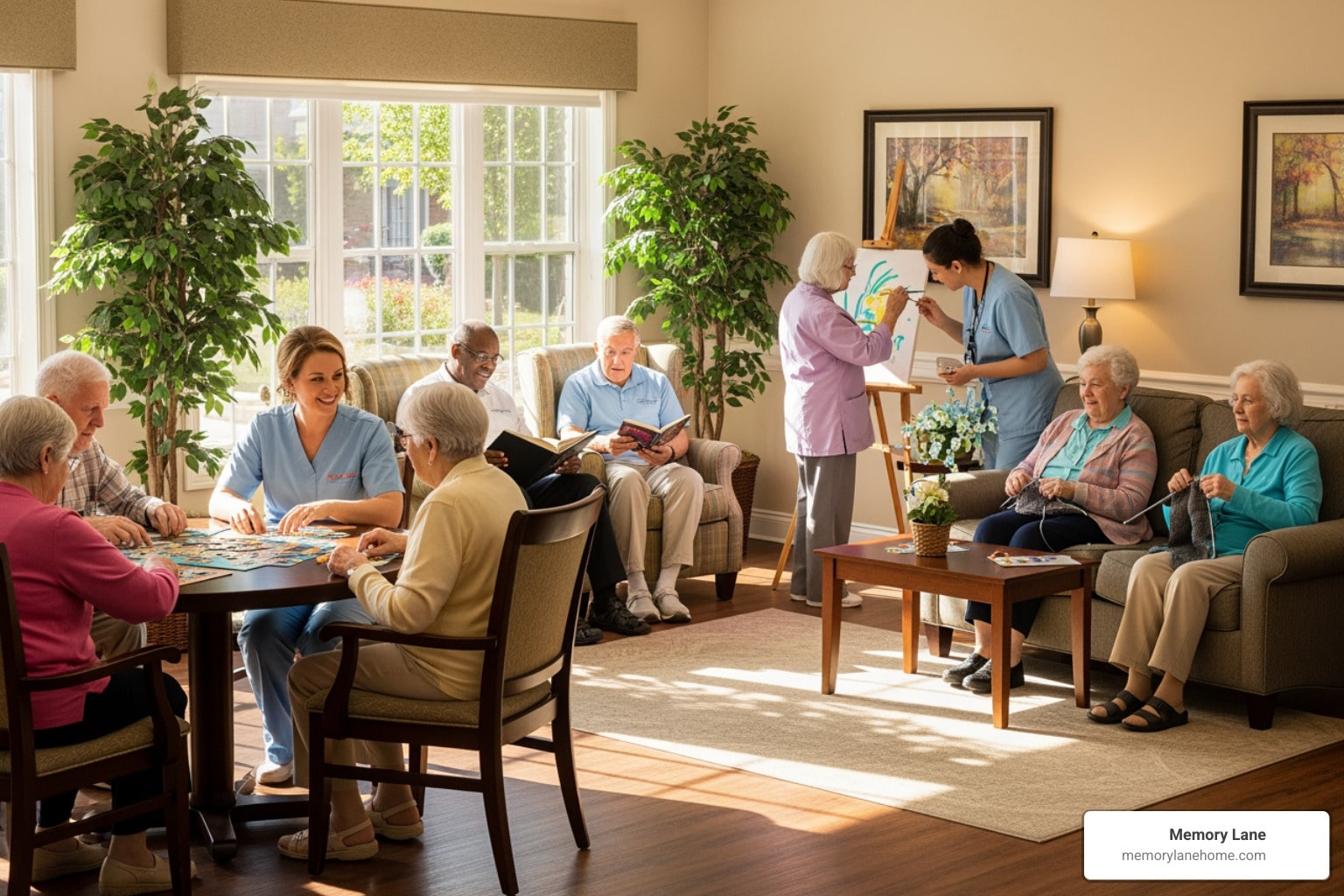Your guide to assisted living Michigan: explore costs, services, financial aid, and top communities for senior care.

How to Choose the Right Alzheimer’s Care Home Nearby
How to Choose the Right Alzheimer’s Care Home Nearby

How to Choose Local Alzheimer’s Care Homes: A Complete Guide to Finding the Right Memory Care Facility Near You
Selecting the right Alzheimer’s care facility near you can feel overwhelming when a loved one’s cognitive well-being is at stake. This guide offers clear criteria and practical tools to help families compare Alzheimer’s care facilities nearby, weigh memory care versus assisted living, understand costs and funding, and evaluate key safety, staffing, and engagement features. You’ll also discover what makes Memory Lane’s home-like, six-bedroom ranch house model in Ypsilanti unique, an actionable checklist for on-site visits, and local support resources in the Ann Arbor area.
How to Choose the Right Local Alzheimer’s Memory Care Home
Alzheimer’s disease is a progressive neurological disorder that impairs memory and thinking by causing nerve cell damage, while dementia refers to the decline in cognitive function severe enough to interfere with daily life and independence. This distinction clarifies why specialized memory care is tailored to address both the symptoms and evolving needs of individuals with Alzheimer’s and related dementias. For example, early-stage memory loss may require conversational prompts, whereas advanced dementia demands secure environments and full assistance with personal care.
What Are the Key Symptoms and Stages of Alzheimer’s Disease?
Memory impairment, language difficulties, and disorientation mark the three main stages of Alzheimer’s disease, each requiring different levels of support. Below is an outline of these phases, their characteristic challenges, and corresponding care requirements.
By matching care intensity to each stage, families ensure that memory care services adapt as dementia advances, leading into the different types of dementia and how care approaches vary.
Stages of Alzheimer’s Disease – en
Research indicates that Alzheimer’s disease progresses through distinct stages, each characterized by specific symptoms and care needs. Early stages may involve memory loss and mood changes, while later stages can include severe memory loss and physical limitations, requiring different levels of support and care.
Alzheimer’s Association, “Stages of Alzheimer’s Disease” (2024)
What Are the Different Types of Dementia and Their Care Needs?

Alzheimer’s disease is the most common form of dementia, but others—such as vascular dementia, Lewy body dementia, and frontotemporal dementia—present unique patterns of symptoms and progression.
- Vascular dementia follows strokes and often requires blood pressure and heart-health monitoring alongside cognitive support.
- Lewy body dementia can cause visual hallucinations and movement challenges, calling for specialized fall prevention and sensory engagement.
- Frontotemporal dementia impacts behavior and language first, necessitating communication-focused therapies and structured emotional support.
These subtypes highlight why a facility must offer a range of therapeutic programs and staff trained in the specific nuances of each dementia form, preparing us to explore how stage and type together shape memory care requirements.
How Do Dementia Stages Affect Memory Care Requirements?
As dementia progresses from mild to severe, memory care shifts from gentle cognitive exercises to intensive safety supervision and full assistance with personal activities. Early memory care emphasizes orientation, social interaction, and therapeutic games to sustain independence, while later stages focus on mobility support, skilled nursing for complex health needs, and continuous monitoring to prevent wandering. Understanding this progression ensures that care homes maintain flexible personalized plans, which leads into a comparison of specialized memory care versus general assisted living environments.
What Is the Difference Between Memory Care and Assisted Living? Choosing the Right Care Type
Memory care provides a secure, structured environment with staff trained specifically in dementia management, whereas assisted living supports seniors who need help with daily activities but maintain more independence. This clear distinction helps families target facilities optimized for cognitive impairment and wandering prevention while comparing standard assisted living that focuses on general mobility and social services.
Memory Care vs. Assisted Living – en
Memory care facilities offer specialized environments and trained staff to address the unique needs of individuals with dementia, including safety features and structured programs. Assisted living provides support for daily activities but may not offer the same level of specialized care for cognitive impairment and wandering prevention.
National Institute on Aging, “Alzheimer’s Disease: What It Is, How to Cope, and Where to Get Help” (2023)
How Do Services and Environments Differ Between Memory Care and Assisted Living?
Facilities dedicated to memory care feature locked exterior doors, controlled access points, and enclosed outdoor areas to reduce elopement risk. Staff-to-resident ratios in memory care typically allow for one caregiver per three residents during the day, while assisted living may average one to six. Memory care units also integrate daily cognitive stimulation programs and sensory activities, whereas assisted living prioritizes communal dining, recreational outings, and medication management. These specialized elements frame when to consider transitioning a loved one to memory care.
When Should You Consider Moving a Loved One to Memory Care?
Families often decide to move a loved one to memory care when they notice frequent wandering, repeated safety incidents such as cooking mishaps, or consistent disorientation to time and place. Declining personal hygiene, increased agitation, and the inability to follow basic instructions are additional indicators that specialized dementia support is necessary. Recognizing these signs early ensures a smoother adjustment and minimizes crisis-driven placements.
What Are the Benefits of Specialized Memory Care Facilities?
Specialized memory care facilities enhance quality of life by combining secure environments with therapeutic programming proven to support cognition and mood. Dedicated staff receive ongoing dementia-specific training in techniques like validation therapy and reminiscence activities. Residents benefit from consistent routines that reduce anxiety, personalized life story projects, and small household models that foster familiarity and attachment, leading to stronger engagement and fewer behavioral challenges.
What Are the Essential Factors to Evaluate When Choosing an Alzheimer’s Care Home?
Evaluating an Alzheimer’s care home involves assessing staff expertise, safety features, personalized care plans, and family engagement pathways. These factors ensure compassionate, competent care that adapts to each resident’s evolving needs while promoting dignity and social connection.
How Important Is Staff Expertise and Caregiver-to-Resident Ratio?
Trained dementia care professionals who understand memory loss behaviors provide more effective support, using techniques like cueing, redirection, and gentle reassurance. A high caregiver-to-resident ratio—ideally one staff member for every three residents—ensures that each individual receives attentive, individualized assistance. This personalized focus directly impacts safety, daily engagement, and emotional well-being.
What Safety and Security Features Should You Look For?
Look for secure entry systems, motion-sensor alarms on exit doors, and wander-prevention fencing to protect residents from elopement. Hallways should have contrasting handrails and flooring to reduce falls, while private rooms need emergency response systems. These design elements create a safe environment that encourages mobility and independence within carefully controlled boundaries.
How Do Personalized Care Plans and Resident Engagement Improve Quality of Life?
Individualized care plans that incorporate life history, personal preferences, and unique strengths help staff tailor activities, dietary choices, and therapeutic goals. Engaging residents in meaningful activities—such as music therapy, gardening, or art projects—supports cognitive stimulation and emotional expression. Personalized engagement fosters a sense of purpose and preserves identity amid progressive memory loss.
Why Is Family Involvement and Communication Critical in Memory Care?
Ongoing family involvement, including care conferences, scheduled updates, and open visitation policies, ensures that care decisions reflect residents’ values and preferences. Clear two-way communication builds trust and allows families to share insights on behavior triggers, favorite pastimes, and effective soothing techniques. This partnership enhances consistency and continuity between home and facility care.
How Much Does Alzheimer’s Memory Care Cost and What Are the Funding Options?
Memory care costs vary widely based on location, facility size, and service scope, but families can access a mix of private pay, long-term care insurance, veterans benefits, and state Medicaid waivers to manage expenses. Understanding the average rates and available financial pathways empowers families to plan budgets and secure coverage.
What Is the Average Cost of Memory Care in Ypsilanti and Nearby Areas?
In Ypsilanti and the Ann Arbor region, average monthly rates for memory care range from $5,500 to $8,000 depending on room type and amenities offered. Facilities with specialized dementia programs and higher staffing ratios often sit at the upper end of this range, reflecting the cost of trained personnel and secure household models.
What Payment Options Are Available for Dementia Care?
Families can combine private funds, long-term care insurance payouts, veteran’s Aid & Attendance benefits, and life-care contracts. Long-term care insurance may cover a portion of memory care costs if the policy includes dementia benefits, while VA programs offer monthly stipends for qualifying veterans and surviving spouses. Coordinating multiple sources maximizes support.
Does Medicaid Cover Memory Care for Dementia in Michigan?
Michigan’s Home and Community-Based Services Waiver can fund certain memory care services within assisted living settings but typically does not cover room and board costs. Full Medicaid coverage for dementia often applies to nursing home care. Families should consult a Medicaid planner to explore HCBS eligibility and maximize benefit utilization.
How Can Families Navigate Financial Assistance and Funding Resources?
Engaging a certified elder law attorney or a Medicaid planner helps families assess eligibility for state waivers and VA benefits, complete required applications, and explore community programs offering supplemental grants. Financial counselors at memory care communities can also guide families through insurance claims and payment plan options, ensuring clarity and peace of mind.
What Makes Memory Lane’s Home-Like Memory Care Model Unique in Ypsilanti?
Memory Lane’s Home-Like Memory Care Model in Ypsilanti stands out for its unique approach that prioritizes the comfort and well-being of residents dealing with memory-related challenges. At the heart of this model is a commitment to creating a warm, nurturing environment that feels more like home rather than a conventional care facility. This philosophy is reflected in the thoughtfully designed living spaces, which encourage social interaction and foster a sense of community among residents. By integrating familiar surroundings and personal touches, Memory Lane helps individuals retain their sense of identity while providing the support they need.
Furthermore, Memory Lane embraces a person-centered care approach, tailoring support to meet the specific needs and preferences of each resident. This individualized attention extends beyond daily routines to encompass cognitive engagement, emotional support, and social involvement. Trained staff members are deeply attuned to the nuances of dementia and memory loss, ensuring that every interaction is empathetic and reassuring. By focusing on building meaningful relationships and promoting independence within a safe environment, Memory Lane not only enhances the quality of life for its residents but also brings peace of mind to families, knowing their loved ones are being cared for with compassion and dignity.
Memory Lane’s model features multiple six-bedroom ranch houses designed to feel like neighborhoods rather than institutions, fostering familiarity and comfort for residents with Alzheimer’s and other dementias. This small-house approach promotes deeper relationships, consistent staffing, and an intimate scale that aligns with best practices in dementia care.
How Does the 6-Bedroom Ranch House Model Benefit Residents?
By limiting each home to six residents, Memory Lane ensures personalized attention and genuine social bonds. Residents recognize roommates and caregivers, creating a predictable social circle that reduces confusion. Shared living spaces—kitchen, living room, and backyard—mirror a family home, supporting routine tasks like meal preparation and gentle outdoor strolls.
What Is the Impact of High Caregiver-to-Resident Ratios on Care Quality?
Maintaining a daytime ratio of one caregiver for every three residents and one for every six at night ensures rapid response to needs, individualized supervision, and more frequent therapeutic interactions. These staffing levels correlate with fewer behavioral crises, lower fall rates, and higher satisfaction scores among families trusting memory care placement.
Which Specialized Programs and Activities Support Cognitive and Emotional Well-being?
Memory Lane offers evidence-based activities such as music and pet therapy, multi-sensory experiences, and memory-enhancement games that reinforce neural pathways. Residents participate in tailored routines like gardening clubs, reminiscence circles, and adaptive exercise classes, all overseen by trained dementia specialists. These programs promote engagement, mood stabilization, and a sense of belonging.
What Is an Actionable Checklist for Choosing the Best Alzheimer’s Care Facility?
An actionable checklist for choosing the best Alzheimer’s care facility serves as a vital resource for families seeking suitable accommodations for their loved ones. This checklist is not merely a list of items; rather, it encapsulates the essential criteria and considerations necessary for making an informed decision. It encompasses various aspects including the facility’s safety measures, staff qualifications, and available medical services. Families often find the process overwhelming, but a structured checklist helps streamline the evaluation by ensuring that no critical factors are overlooked. By addressing specific needs and preferences, the checklist empowers families to assess each option systematically and to prioritize what is most important for their loved one’s well-being.
In addition to facilitating a comprehensive evaluation, an actionable checklist serves as a conversation starter between families and facility administrators. It encourages open dialogue about the care plans, daily activities, and overall environment residents will experience. For instance, the checklist may include questions about staff-to-resident ratios, training in dementia care, and social engagement opportunities within the facility. Moreover, it may suggest visiting times and activities to observe firsthand how staff interacts with residents, giving families insight into the quality of care provided. Utilizing this checklist not only aids in selecting the best Alzheimer’s care facility but also ensures that families can feel confident and secure in their choice, ultimately contributing to a supportive and nurturing environment for their loved ones.

An actionable checklist guides families through on-site comparisons, ensuring consistent evaluation of critical factors. Using this tool simplifies decision-making and guarantees no important attribute is overlooked.
What Are the Top Criteria to Include in a Dementia Care Checklist?
- Staff Training Levels – Verify that caregivers have dementia-specific certifications and ongoing education.
- Safety Features – Confirm secure exits, wander-prevention systems, and fall-reduction design elements.
- Personalized Care Plans – Check evidence of individualized routines and resident life-history integration.
- Engagement Programs – Ensure availability of therapeutic activities for cognition and emotional support.
- Family Communication – Review policies on regular updates, care conferences, and flexible visitation.
This structured approach equips families to compare facilities objectively before arranging tours or consultations.
How Can Families Use This Checklist to Compare Local Care Homes?
Families can rank each facility on a scale of 1–5 for every criterion, noting observations and staff responses during visits. Collating these scores highlights the best matches for a loved one’s needs and values, leading naturally to thoughtful questions during on-site meetings.
What Questions Should You Ask During Facility Tours and Consultations?
- How are caregivers trained in Alzheimer’s disease management?
- What is the current caregiver-to-resident ratio on each shift?
- Can you describe your wander-management and emergency response procedures?
- How do you tailor daily activities to individual interests and abilities?
- How do you involve families in care planning and updates?
These inquiries clarify operational standards and reinforce confidence in the facility’s commitment to specialized memory care.
How Can Families Find Support While Navigating Alzheimer’s Care Decisions?
Navigating Alzheimer’s care decisions can be a challenging journey for families, often filled with emotional and logistical hurdles. To find the support they need, families can begin by reaching out to healthcare professionals specializing in dementia care. Geriatricians, neurologists, and social workers can provide invaluable guidance on the disease’s progression, treatment options, and necessary resources. Additionally, reputable organizations such as the Alzheimer’s Association offer a wealth of information, including local support groups and caregiver training programs. These resources can help families feel less overwhelmed and more equipped to make informed decisions regarding their loved one’s care.
Furthermore, creating a robust support network that includes family members, friends, and other caregivers is essential. Open communication about the challenges and emotions associated with Alzheimer’s can foster a sense of unity and understanding among caregivers, making it easier to share responsibilities and seek advice. Online forums and social media support groups also provide spaces for caregivers to connect with others facing similar situations, allowing them to exchange tips, experiences, and emotional support. By leveraging both professional advice and community connections, families can navigate the complexities of Alzheimer’s care decisions with greater confidence and compassion.
Navigating Alzheimer’s care decisions can be a challenging journey for families, often filled with emotional and logistical hurdles. To find the support they need, families can begin by reaching out to healthcare professionals specializing in dementia care. Geriatricians, neurologists, and social workers can provide invaluable guidance on the disease’s progression, treatment options, and necessary resources. Additionally, reputable organizations such as the Alzheimer’s Association offer a wealth of information, including local support groups and caregiver training programs. These resources can help families feel less overwhelmed and more equipped to make informed decisions regarding their loved one’s care.
Furthermore, creating a robust support network that includes family members, friends, and other caregivers is essential. Open communication about the challenges and emotions associated with Alzheimer’s can foster a sense of unity and understanding among caregivers, making it easier to share responsibilities and seek advice. Online forums and social media support groups also provide spaces for caregivers to connect with others facing similar situations, allowing them to exchange tips, experiences, and emotional support. By leveraging both professional advice and community connections, families can navigate the complexities of Alzheimer’s care decisions with greater confidence and compassion.
Choosing memory care is emotionally demanding, and accessing community resources and empathetic partnerships eases the journey. Families benefit from both practical guidance and peer support networks in the Ypsilanti and Ann Arbor areas.
What Resources Are Available for Families in Ypsilanti and Ann Arbor?
- Senior Alliance offers caregiver support groups and educational workshops.
- The Alzheimer’s Association’s Michigan chapter provides helplines, training classes, and local safety programs.
- Area agency on aging programs connect families to respite care and transportation services.
These resources complement facility care by addressing caregiver well-being and community integration.
How Does Memory Lane Support Families Through the Care Journey?
Memory Lane partners with families by providing regular care consultations, educational seminars on dementia progression, and 24/7 access to on-site clinical staff. Family liaisons facilitate personalized transition plans, assist with funding questions, and host quarterly memory cafés that foster shared understanding and mutual support.
What Are Common Emotional Challenges and How Can Families Cope?
Families often experience grief, guilt, and stress when transitioning loved ones to memory care. Coping strategies include joining peer support groups to share experiences, scheduling regular self-care breaks with respite services, and engaging in counseling or mindfulness practices. Building a support network helps families maintain resilience and sustain advocacy for their relatives’ quality of life. Choosing the right Alzheimer’s care home means balancing safety, specialized expertise, and a nurturing environment that honors each individual’s dignity. By understanding dementia fundamentals, comparing care models, evaluating essential factors, and tapping into local resources, families can make informed decisions with confidence. Memory Lane’s home-like ranch house approach, high staff ratios, and tailored programs illustrate how personalized memory care creates a supportive community where residents continue to thrive despite cognitive changes.
Frequently Asked Questions
What should I consider when visiting a memory care facility?
When visiting a memory care facility, focus on the environment, staff interactions, and available activities. Observe how caregivers engage with residents and whether they seem attentive and compassionate. Check for safety features like secure exits and emergency response systems. Additionally, inquire about the types of activities offered and how they cater to residents’ cognitive and emotional needs. A welcoming atmosphere and a sense of community are also crucial indicators of a quality memory care home.
How can I assess the quality of care in a memory care facility?
To assess the quality of care in a memory care facility, look for staff qualifications, training, and the caregiver-to-resident ratio. High-quality facilities typically have well-trained staff who specialize in dementia care. Ask about their approach to personalized care plans and how they adapt to residents’ changing needs. Additionally, seek feedback from current residents’ families and review any available ratings or reports from regulatory agencies to gauge overall satisfaction and care standards.
What role do therapeutic activities play in memory care?
Therapeutic activities are essential in memory care as they promote cognitive engagement, emotional well-being, and social interaction among residents. Activities such as music therapy, art projects, and reminiscence therapy help stimulate memory and provide a sense of purpose. These programs are designed to cater to individual interests and abilities, fostering a supportive environment that enhances quality of life. Regular participation in such activities can also reduce anxiety and improve mood, making them a vital component of effective memory care.
How can families stay involved in their loved one’s care?
Families can stay involved in their loved one’s care by maintaining open communication with the facility staff and participating in care planning meetings. Regular visits and engagement in activities can help strengthen relationships and provide emotional support. Many facilities encourage family involvement through care conferences, updates on resident progress, and opportunities to participate in social events. Being actively involved not only helps families stay informed but also enhances the resident’s sense of connection and belonging.
What are the signs that a memory care facility is a good fit?
Signs that a memory care facility is a good fit include a welcoming atmosphere, attentive staff, and a strong focus on individualized care. Look for facilities that prioritize safety and security while offering a variety of engaging activities tailored to residents’ needs. Positive feedback from current residents and their families, as well as transparent communication from staff, are also good indicators. Additionally, a facility that encourages family involvement and provides resources for support can enhance the overall experience for both residents and their families.
What should I do if I have concerns about my loved one’s care?
If you have concerns about your loved one’s care, it’s important to address them promptly. Start by discussing your concerns directly with the facility’s management or care staff to gain clarity and understand their approach. Document specific incidents or observations to provide context. If issues persist, consider involving a third party, such as a resident advocate or regulatory agency, to ensure that your loved one’s needs are being met. Open communication is key to resolving concerns and ensuring quality care.


